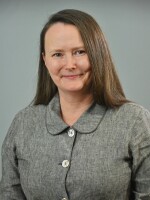For the past 20 years, the nonprofit Folk Alliance International has promoted and celebrated folk music. The organization relocated last year from Memphis, Tenn., to Kansas City, Mo. And, later this month, nearly 250 artists, from Sam Baker to Chuck Mead & His Grassy Knoll Boys, are scheduled to perform in about a dozen venues in Kansas City during the group's annual conference. The opening night showcase highlights local musicians, including Betse Ellis and Howard Iceberg.
Not a 'traditional folkie'
Howard Iceberg wears a flannel shirt and suspenders as he strums a guitar in the office of his West Side home in Kansas City, Mo. He's working on a new song, trying out the lyrics as they come to him.
An immigration lawyer by day and a prolific songwriter and musician by night, Iceberg says he tries to write songs that connect with people.
"I am not a 'traditional folkie,' although I came up that way more than 30 years ago. Playing early Carter Family songs is maybe the first thing I did," recalls Iceberg. "And I started to learn just the littlest bit of music and, before I knew it, instead of playing other people’s songs, my own songs started popping out, hundreds and hundreds of songs, and, you know, some good ones and a lot of bad ones."
Iceberg says he doesn’t limit himself to any one genre in his songwriting. He says his view of folk music embraces many different styles.
"I would define folk music as any music that’s written out of people’s hearts, you know," says Iceberg. "Not stuff that’s written to be commercial and just sell records. But Thelonious Monk said it’s all folk and that’s what I think."

Not one Kansas City sound, but 'a Kansas City attitude'
But beyond the folk landscape, Iceberg says that the contemporary Kansas City music scene is unique and often overlooked.
"Kansas City is an under-appreciated scene, I think," Iceberg says. "It’s not the same as the old Kansas City with Joe Turner and Jay McShann and Count Basie, but having been here and been involved with the music scene for many years, I think that there’s a lot of great music of different styles.
"And so I wouldn’t say that there’s one Kansas City sound, but there is a Kansas City attitude. And a lot of us who write this independent and original music, we’re pals with each other and we trade ideas and we play in each other’s shows and help each other out.”
Musicians working in collaboration
Since the early 1990's, Iceberg and his band, Howard Iceberg and The Titanics, have worked with hundreds of area musicians in this spirit of civic collaboration.
"I don’t know if it’s a real competitive or dog-eat-dog scene in other cities, but in Kansas City, I don’t feel it’s that way," Iceberg says. "I think of myself more as I am just a writer trying to document my songs, so for more than 10 years now I have different songs that I want to, like, preserve."
He adds: "And I’ll often meet some new musicians and say, ‘Hey, would you help me work these up,’ and just come in and do two or three songs and record them. And these are just independent, separate little projects and sometimes they see the light of day and a lot of times they don’t. I just stack them up. But I see the camaraderie and the generosity and the ability of Kansas City musicians as being a great place to work."
Discovering music that speaks deeply
In Midtown Kansas City, Mo., and on the other side of the folk spectrum, Betse Ellis is practicing a spiritual tune from the Ozarks. Ellis says her Southern roots have helped define both the music she seeks and the new music she creates.
"I grew up in Fayetteville, Arkansas," says Ellis. "The reason that’s important is that it’s in part of the Ozarks and I had to go through a lot of different kinds of music, which I still embrace, in order to discover music that comes from the Ozarks, which speaks to me, perhaps more deeply, than anywhere else."
Some describe the time before bluegrass as "the golden age of old-time music." Ellis says she finds many of her favorite tunes on obscure recordings from that era.
"Those really, really old traditional tunes. Old ballads, but also, like love songs, or spiritual quest kind of songs, those are the things that I keep reaching out to and I do that with my own music as well," Ellis says. "I don’t know if my music is an extension of the music that I really am inspired by, but it’s certainly a result of being exposed to all the different music that I love and that I still continue to discover."
Passing on the joy of discovering music
Ellis says part of what drives her love of music is the discovery of the music that came before her.
"What makes something traditional and folk is one of the things that keeps me in this line of music that keeps me really interested in this process that doesn’t ever have to have an actual solution. It doesn’t have to have a final answer but talking to other people, exploring music with other people along the way is what keeps it really interesting to me," Ellis says.
"If we look at just the word folk and how that’s another term for people, I boil it down to that. It’s the music of the people and, for me, folk music is often music that maybe has been passed down from one generation to the next."
For Ellis, passing her songs to the next generation is just a part of the great folk music tradition.
The 2014 Folk Alliance Conference runs Feb. 19-23, 2014, at the Westin Crown Center Hotel in Kansas City, Mo. The schedule of musicians can be found here.





